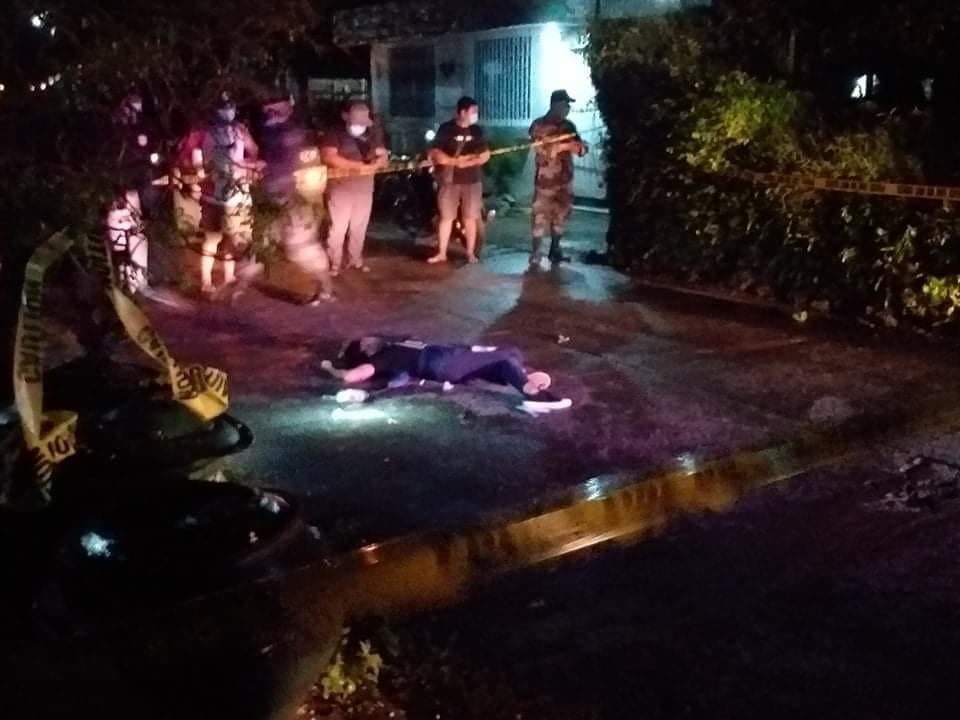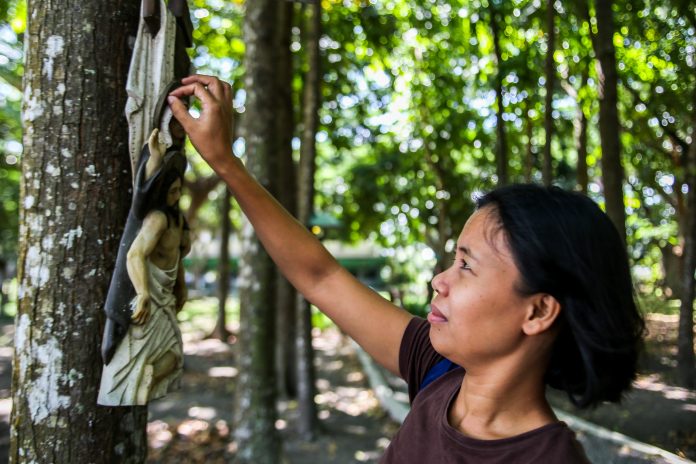The scene had become typical, almost ritualistic.
As rains poured, a body lay still on the concrete road. Lifeless. Overspread with plastic. A few feet away, a man in dark clothes stood over the corpse. A yellow police line cut brazenly across the photograph as if telling everyone to steer clear of the crime scene.
On the night of Aug. 17, human rights advocate and health worker Zara Alvarez, 39, was gunned down by still unknown assailants along Sta. Maria Street in Erocero, Bacolod City, Negros Occidental.
Bishop Gerardo A. Alminaza of San Carlos describes Alvarez in an Aug. 18 press statement as “a human rights champion in the Negros island, an activist, organizer and ecumenical church worker. Her active involvement in the Church People -Workers Solidarity is worthy of emulation—always reminding us to be prophetic in our work of evangelization and social justice.”
He added, “I bleed of this never-ending injustice and violence, someone closest in my work with the oppressed is murdered. I just cannot believe this continuing madness of senseless killings! These systemic killings of human rights defenders and activists must be condemned and must stop! Our responsible agencies must pursue justice and accountability on those responsible and should never allow impunity of criminals doing senseless executions of Filipinos!”
On the morning of the assassination of Alvarez, peace negotiator Randall “Randy” Echanis, also a victim of what is believed to be state-sanctioned violence, was brought to his final resting place.
Just hours after Alvarez was gunned down, the group Karapatan Negros Island reported that its secretary general, Clarizza Singson, received a death threat in the official Facebook page of the group.
Nothing new
On Aug. 16, the same group posted on its Facebook page the continuing harassment of farmers allegedly by the 62nd IB of the Philippine Army. The farmers are from Sitio Maluy-a, Brgy. Sandayao, Guihulngan City, Negros Oriental.
Reken Remasog, a 24-year-old farmer and father to a nine-month-old son, was said to have been amputated and later killed by soldiers. His brother Reniel, 17, was reportedly arrested on trumped-up charges of murder.
Several others were detained, mostly minors. Meriam Benero, 17, and Mary Ann Pesculado, 15, were captured and falsely charged as NPA recruits.
The next morning at around half-past eleven, Aug. 17, the Communist Party of the Philippines (CCP) reported the death of 10 soldiers belonging to the 62nd IB during an ambush staged by the New People’s Army (NPA) in Sitio Tabago, Bgy. Sandayao. “The 62nd IB is under the command of Lt. Col. Melvin Flores,” the report also said.
The NPA charged the 303rd Brigade, which commands the 62nd IB, “for attacking civilians and fabricating encounters to hide their crimes.”
Assassinations continue
As cases of Covid-19 breached the 160,000th mark, the death toll of “vigilante killings” also rose.
The Human Rights Watch (HRW) World Report 2020 said, “The Philippine National Police reported that 5,526 suspects were killed in police operations from July 1, 2016 to June 30, 2019. However, this number does not include the thousands more whom unidentified gunmen killed in cases that the police do not seriously investigate, pushing the death toll to as high as 27,000 according to estimates by domestic human rights groups.”
Today, some groups estimate the death toll at 35,000, perhaps even more.
The HRW report also noted that as early as July 2019, activist farmers and farmer group leaders in Negros Oriental have been the target of what is believed to be state-sanctioned murders, including 14 land activists killed just days apart.
As of this writing, more than 100 farmers have been murdered, the year 2017 being the bloodiest year for land activists and farmhands. According to Karapatan, the provinces of Bukidnon, Negros Oriental and Negros Occidental, and Compostela Valley suffered the most losses.
Many of the victims of assassinations had been fighting for agrarian reforms.

‘Oplan Sauron’
Many blamed ‘Oplan Sauron,” Pres. Rodrigo Duterte’s intensified anti-Left military campaign based on his Memorandum Order No. 32, for the killings.
Oplan Sauron directs “the military and the police to undertake all necessary measures to suppress any and all forms of lawless violence in the Mindanao region and the provinces of Negros Oriental, Negros Occidental, Samar and Bicol”.
Apparently, Oplan Sauron (named after the “Dark Lord” of the Lord of the Rings Trilogy) was the direct result of the killing of four policemen in July 2019 allegedly by the Communist Party of the Philippines-New People’s Army-National Democratic Front (CPP-NPA-NDF).
Former Philippine National Police (PNP) Director General Oscar Albayalde said in a statement at the time, “We are calling on the people of Negros Oriental to maintain their allegiance to the sovereign power of the state, reject and deny the promotion of arms struggle being viciously inculcated in the minds and hearts of the people by the CPP/NPA/NDF terrorists for this is the greatest hindrance to progress and development that everyone is entitled to enjoy.”
The Commission on Human Rights (CHR), however, denounced the military offensive. The CHR said government should instead address “the root causes of violence, such as land issues and the plight of farmers than deploying more troops.”
Human rights groups doubt that Oplan Sauron was anything close to “suppressing lawless violence,” as the government claims, pointing out that most victims were too old to function of assassins.
One report published by Kadao Productions said, “Never mind that many of the dead were in their 50s to late 60s, way too old to be the communist hitmen, who tend to be young, quick and agile, police claim they were, and two of those slain in Manjuyod were elected village chieftains—Valentin Acabal and Sonny Palactiw. Of the eight men killed in Canlaon, one was a Catholic lay minister and two – one of two father-and-son pairs – volunteer church workers.”
HRW added that the killing of civilians in the war between government and rebel groups is considered a very serious crime. “Responsibility for the killings remains unclear. But both the government and the NPA should take all necessary measures to end unlawful attacks, either by their forces or armed elements linked to them. Killing civilians and captured combatants are war crimes.”
Power is impunity
The murders of activists Randy Echanis and Zara Alvarez are but two of the tens of thousands who fell under this administration’s iron grip. These two cases, as the multitude of others before them, are expected to first get lost in the paperwork, and then to memory.
In the 13 countries that make up the roster of offenders, the Philippines had ranked 5th in the 2019 Global Impunity Index. Under the Duterte administration, crimes such as I have mentioned remained unsolved after four years in office.
As Uruguayan journalist Eduardo Galeano once said, impunity is crime’s reward and it is democracy that pays the price. If such is the case, we cannot remain calm.









